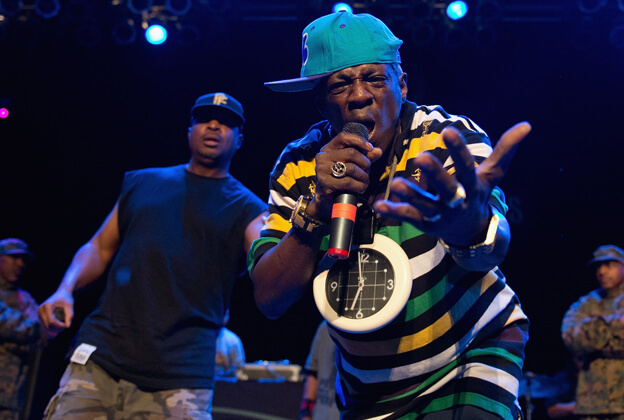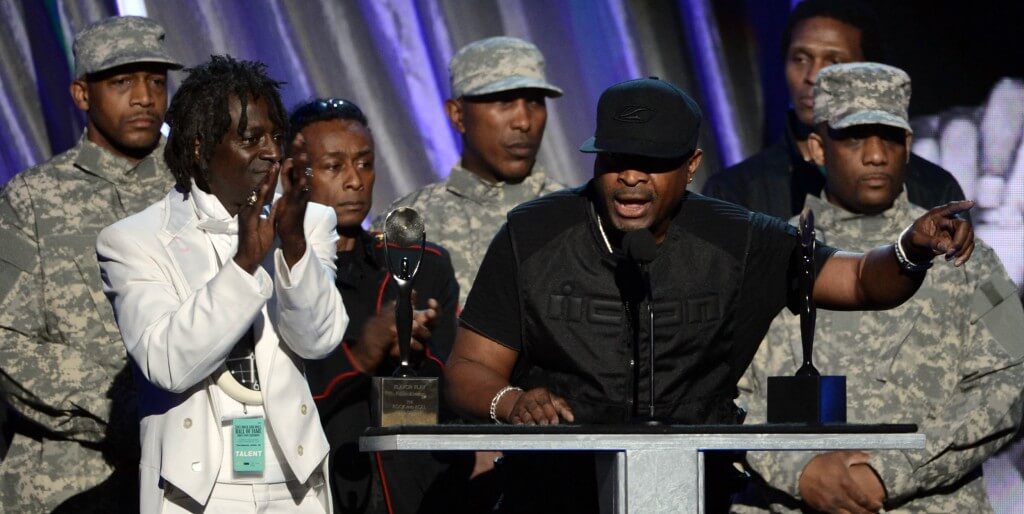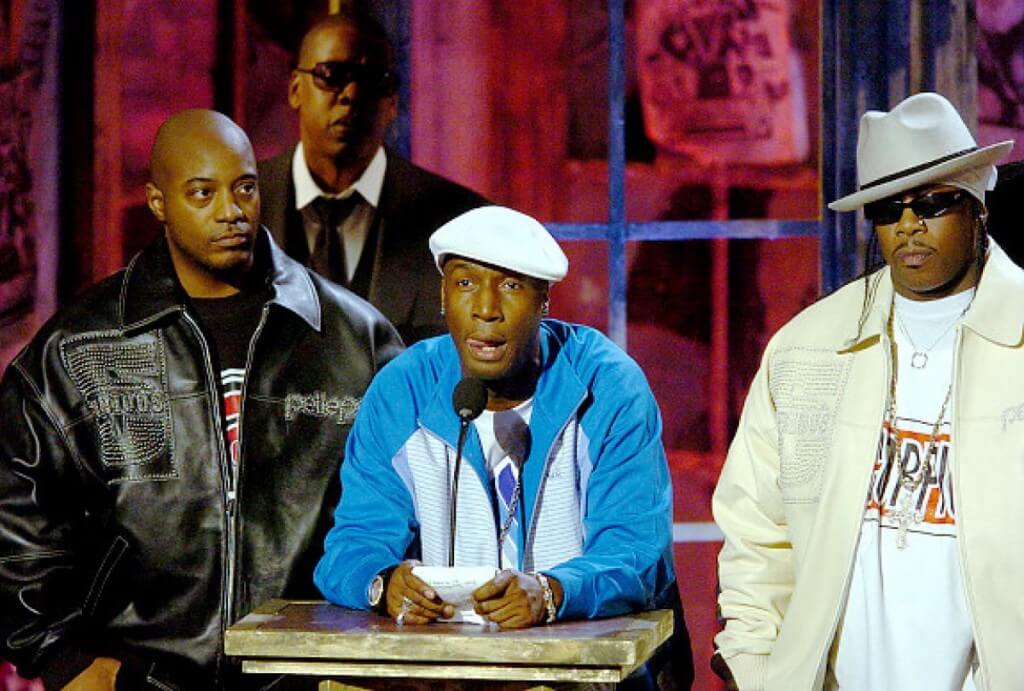
Public Enemy (Photo Getty Images)
“You’ve got Grandmaster Flash in the Rock and Roll Hall of Fame? Run-DMC in the Rock and Roll Hall of Fame? You’re killing me! [It] doesn’t mean those aren’t good artists. But … they sample and they talk. Not even sing! … If you don’t play guitar and you don’t write your own songs, you don’t belong there.” – Gene Simmons
“We all come from the damn blues! We know, and we’ve always known and we pay respect.”—Chuck D at Public Enemy’s induction into the Rock and Roll Hall of Fame
“Rap is the new rock and roll! We’re the new rockstars…we’re the new rockstars and I’m the biggest of all of them”—Kanye West

LOS ANGELES, CA – APRIL 18: (L-R) Inductees Flava Flav, Professor Griff and Chuck D accept award on stage at the 28th Annual Rock and Roll Hall of Fame Induction Ceremony at Nokia Theatre L.A. Live on April 18, 2013 in Los Angeles, California. (Photo by Kevin Winter/Getty Images)
The infamous institution that is the Rock and Roll Hall of Fame has never been able to stay away from controversy, and not for a want of it. For an institution that is dedicated to immortalizing rock and roll’s greatest heroes, there are many inductees in there who are not quite typically thought of as rock artists: Miles Davis, Madonna, Donna Summer, Leonard Cohen, Gene Pitney, Laura Nyro, Tom Waits, and several soul and funk groups. The confusion behind these inductees lies not with the quality of their work, but rather the categorization of it.
Of considerable discussion is the place of Hip Hop within the Hall of Fame. As of now, there are four Hip Hop groups that have been inducted: Grandmaster Flash and the Furious Five, Run-DMC, the Beastie Boys, and Public Enemy. There are four other artists who have been nominated but have yet to be inducted—Afrika Bambaataa, LL Cool J, Eric B. and Rakim, N.W.A—and four more groups who have been considered for the ballot but who have not yet been nominated—Boogie Down Productions, De La Soul, the Sugarhill Gang, and the Treacherous Three. Additional artists considered pioneers of the genre have also been considered, including The Last Poets, Gil-Scott Heron, and Joe Tex (nominated four times without induction). On top of this, there are twenty-six Hip Hop songs in the Hall of Fame’s list of the Songs that Shaped Rock and Roll.

Grand Master Flash & The Furious Five accept their award onstage at the 22nd annual Rock And Roll Hall Of Fame Induction Ceremony in NYC, 2007 (Photo by Scott Gries/Getty Images)
Looking at this list, it is clear to see that the Hall of Fame’s nominating committee has certainly kept Hip Hop interestingly high in its list of priorities. Ever since Grandmaster Flash and the Furious Five became the first Hip Hop group inducted in 2007, it started a trend of inducting that will most likely continue in the future. The Hall of Fame’s statement is loud and clear: Hip Hop is a part of the heritage of rock and roll. To put it in more definitive terms, Hip Hop is rock and roll.
But is it really?
The answer seems simple. No, Hip Hop does not usually contain catchy electric guitar riffs. No, Hip Hop is usually not melodic throughout except for hooks. No, most rappers do not usually specialize in particular instruments (although Hip Hop bands have existed, like the Roots or Arrested Development). And often, key parts of beats are stolen from other songs. So, by Gene Simmons’ definition, no, Hip Hop is not typical “rock and roll”.
But is that true?
Let’s take a brief look at some key highlights in Hip Hop history. The general consensus is that Hip Hop started out from Bronx parties held by DJ Kool Herc in the early 1970s. In these parties, Kool Herc would take funk records by pioneers such as James Brown and Booker T. and the MG’s and mix and match them to create break beats which dancers would break to and he would rap over. This proved to be a major influence on other DJs and artists. “Rapper’s Delight”, released in 1979 and considered the first song to popularize Hip Hop as a musical genre, heavily sampled Chic’s “Good Times”. In turn, Grandmaster Flash would mix this song, along with Blondie’s “Rapture”, Queen’s “Another One Bites the Dust” and various other tunes to create the influential DJ cut “The Adventures of Grandmaster Flash on the Wheels of Steel”. Afrika Bambaataa’s seminal single “Planet Rock”, released just a year after, sampled Kraftwerk and the rock band Babe Ruth. In 1984, Run-DMC released their debut album, featuring the song “Rock Box”, a demonstration in electric guitar. Only the year after would they release King of Rock. The title track opened with “I’m the king of rock, there is none higher/Sucker MC’s should call me sire…”
LL Cool J’s debut Radio, released the same year as King of Rock, also featured use of guitar riffs. In 1986, the former punk band known as the Beastie Boys released their Hip Hop debut Licensed to Ill, also with much use of electric guitar and samples from bands such as Black Sabbath and Led Zeppelin. In the same year, Run-DMC famously collaborated with Aerosmith for a cover of “Walk this Way”. De La Soul would sample rock groups such as Steely Dan and Hall & Oates in songs on their debut, 3 Feet High and Rising. A few years later, Public Enemy would collaborate with the metal group Anthrax for a new version of “Bring the Noise”. Ice-T then started the rock group Body Count, considered the pioneer of rap-metal. From there paved the way for Rage Against the Machine, who soon became the most famous rap-rock group of all time…
Starting to notice a pattern here?
While the genres have significant differences, Hip Hop and rock music have been inexorably entwined since Hip Hop’s conception. As seen with these examples, most of the notable early Hip Hop records have featured samples of rock songs or elements of rock. The effect was achieved vice versa. In 1980, the Clash, inspired by the Sugarhill Gang, recorded a rap song of their own: “The Magnificent Seven”. That same year, the Blondie song “Rapture” became the first song with rapping in it to top the U.S. charts. This was a direct result of Debbie Harry’s fascination with Hip Hop culture—in the song, she name-checks Fab 5 Freddy and Grandmaster Flash. “West End Girls” by Pet Shop Boys was another major ’80s hit that incorporated rapping, taking influence from the Furious Five’s “The Message”. Duran Duran also called the Furious Five an influence, recording a cover of “White Lines” with the group. Sublime recorded an ode to KRS-One on their album 40 Oz. to Freedom. Sonic Youth collaborated with Chuck D on their hit “Kool Thing”, which was based off of an interview between Kim Gordon and LL Cool J. Sonic Youth would also collaborate with Cypress Hill for a song for the Judgment Night soundtrack. Kurt Cobain listed Public Enemy’s It Takes a Nation of Millions to Hold us Back as one of his fifty favorite albums. Countless more examples abound.
All of this does not mean that the two genres have always enjoyed a pleasant relationship. Many Hip Hop artists have attempted to put a wall between themselves and rock music. On “Rock the Bells”, LL Cool J disses Bruce Springsteen, Madonna, and Prince over electric guitar chords. Gangsta rap pioneer Schoolly D wrote an open letter with “I Don’t Like Rock and Roll”; in the accompanying video he kidnaps a rock band and brainwashes them into saying “I love rap and I’m proud”. In turn of course, came the hate from the rock community. Gene Simmons called out Grandmaster Flash and the Furious Five and Run-DMC and for not being “rock artists”. David Crosby has tweeted that “rap isn’t music”. Noel Gallagher claimed that having Jay-Z headline Glastonbury in 2008 was just “wrong”; Jay replied by playing “Wonderwall” at his festival set. Similar criticisms followed the announcement of Kanye West performing at the festival this year, with a petition asking that Dr. West be replaced with a “rock band”.
In between the mutual respect and conflict, the question still struggles to be answered. Is Hip Hop rock and roll?
Despite the conflict between the genres, it was the most forward-thinking rock and roll artists who were quick to catch on the changes that Hip Hop was making in the music world. Take another look at the list of rockers who were influenced by Hip Hop in its inception. Is it an accident that those who caught on the trend early, including Blondie and the Clash, were punk rockers who worked in the antithesis of pop music? The same case goes for Sonic Youth and Nirvana, two of the most influential alternative bands of the ’90s.
The point here is, rock and roll was a genre that shook society and changed the world when it was first conceived. As with any innovation that diffuses itself into popular culture, it also became so ubiquitous as to stay complacent at times. What happened when bland rock and roll started to pollute the airwaves? It was declared dead. Then, in spite of the presence of these insipid musicians, there were many who kept the genre alive by tirelessly working at novel sounds and changes in rock and roll’s sonic landscape. The innovators—the ones who kept finding new sounds in rock and roll—were the ones who also embraced Hip Hop as it emerged as a denizen of the music world. Hip Hop emerged as a musical force of invention, and it was encouraged by the innovators. After all, isn’t rock and roll all about change?
Consider the sheer similarities between the genres. Just like rock and roll, Hip Hop was started by African-American performers, birthed from their natural senses of rhythm and creativity and their musical roots. As rock and roll took its cues from jazz, gospel, and the blues, Hip Hop took its cues from soul, funk, and, well, rock and roll. It was used as a form of rebellion against oppression, shook the world and ignited controversy, climbed its way into the top, and now has increased its presence to all aspects of culture, being represented in fashion, books, and other forms of art and expression. It has become the biggest genre in the world, has been declared dead multiple times, and yet has no signs of stopping. It has taken from rock and roll to become its own form of rock and roll, and has influenced the genre right back, as well as all of popular music.
Thus, in my humble opinion, I would say Hip Hop is most definitely a form of rock and roll. Rock’s premier institute seems to have adopted a similar stance, and the genres will most likely continue to mix and influence each other; despite this, there will always be objections from purists. There may never be a full consensus on the issue.
Do you think the Hip Hop is rock and roll?